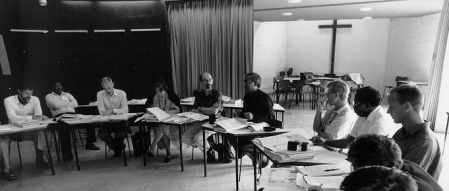ROUND
TABLE GUIDELINES
Adopted by WCC Unit IV Commission
Alexandria, Egypt, June 1995

Round tables (RTs) have been developed since 1984 by the WCC, as new mechanisms of ecumenical sharing of resources. The proliferation of individual projects was found to be piecemeal and unsatisfactory, commitment to funding was usually short-term, and partnership remained underdeveloped.
In 1994-95 a review of the approx. 35 existing RTs was undertaken by the WCC. Based on experience improvements were suggested and a clearer vision and understanding of objectives developped. The present document is an attempt in a very brief and general manner to set out guidelines for RTs sponsored by the WCC. These can be used as an introduction to the RT concept, in evaluating RTs and when considering the creation of new RTs.
WCC Round Tables are an instrument of Ecumenical Sharing of Resources involving church-related partners. The theological concepts of diakonia (service) and koinonia (fellowship) are therefore central to the RT. The RTs are a celebration and sharing of God's gifts: both material and spiritual. RTs can also be seen in the perspective of the Biblical understanding of "jubilee" as a way to foster social justice.
The Round Table approach is an appropriate methodology for arriving at consensus on the sharing of resources and it should be used by the World Council of Churches:
Relationship and dialogue is fundamental to the round table process, firstly between local partners (churches, ecumenical organisations, movements and action groups) and then between local partners and international partners (agencies, missions and sister churches). Only on the basis of a carefully prepared dialogue can there be a genuine exchange of information, analysis and reflection, leading to mutual understanding, identification of common concerns, formulation of policies and setting of priorities and provision of funds for programmes.
In universal terms ecumenical Round Tables provide opportunities:
This happens:
| |
|
|
|
|
|
|
|
|
